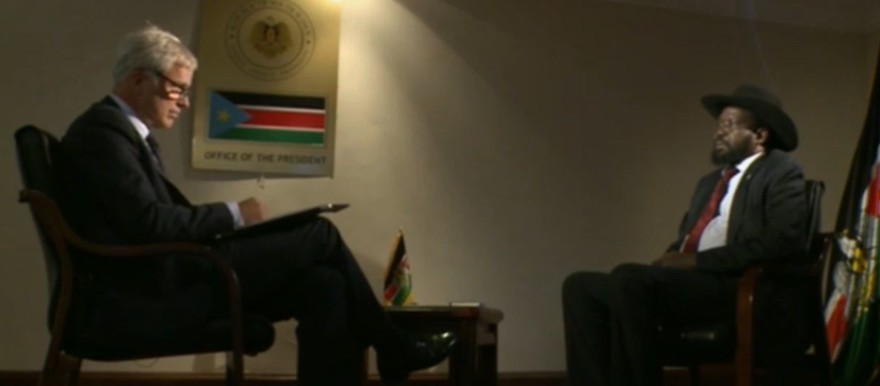South Sudanese President Salva Kiir said in an interview broadcast on Saturday that the United Nations bases in South Sudan are hosting “people who fought physically” against his government, saying these people have ‘guns’ and are ‘agitating.’
This is at minimum the third time that Kiir or his spokesman have made public remarks associating the people under UN protection with ‘rebels.’ The majority of the approximately 100,000 people under protection of peacekeepers are ethnic Nuers.
Kiir made these remarks in an interview with Al Jazeera television recorded last Tuesday but not aired until Saturday. Asked about the situation of the civilians in the UN ‘Protection of Civilians’ sites he said that the suffering of these people is “something they have subjected themselves to.”
“There was no reason for people to run into the camps,” he said.
The president was then challenged by the Al Jazeera interviewer that the people were “fleeing from conflict.” Kiir replied pointing out that some ethnic Nuers in some areas “are safe – they did not die.”
Al Jazeera journalist Nick Clark challenged the president again, saying, “They ran for their own safety – there’s 27,000 still in the camps around Juba and they’re still too scared to come out.”
Kiir replied, “This is one group from the categories that ran to the UN camp. This is a group – the people who fought physically, who were involved in the conflict, when they saw that they were defeated, they ran to the UN for protection.”
He was apparently referring to defecting Nuer members of the Presidential Guard and other SPLA units who fought with Salva Kiir’s forces on the night and morning of 15-16 December in Juba.
The United Nations has reported that these ‘defeated’ Nuer troops were pursued by Kiir’s forces in the early morning of 16 December.
In a human rights report, the UN said Kiir’s troops “ chased them through civilian neighbourhoods, shooting at them on the way… Many soldiers began conducting house-to-house searches, killing, looting, and conducting arbitrary arrests.”
“Corroborated witness accounts indicate that Nuer civilians were targeted and gross violations of human rights and humanitarian law were committed in the process,” the UN Human Rights Division reported.
Apparently some of the surviving Nuer soldiers laid down their guns and uniforms and sought protection of the United Nations Mission in South Sudan (UNMISS), along with tens of thousands of Nuer civilians.
In the interview with Al Jazeera, Kiir went on to reiterate his demand for the guns of these former soldiers to be returned to his forces. “I have been asking for their guns, but the guns have not been given back to me, up to now.”
He added that the group of people under UN protection in Juba “will not accept to come out,” adding, “they are agitating the rest of the other categories, pumping into them fear that if they come out they will be slaughtered.”
‘Rebels inside UNMISS compounds’
Kiir made similar comments in January when he accused UN peacekeepers of plotting to take over the country and harboring his enemies on their bases.
“You will get guns with uniforms [on UN bases]… People come to them with guns. I asked them to give us back our guns… so there is a problem with the international community and it is something that people will have to thrash out with them.”
Similarly, Kiir’s information minister and the official government spokesman has designated unarmed Nuer civilians within UNMISS bases ‘rebels.’
Speaking on 18 April 2014, a day after the massacre of more than 50 ethnic Nuers inside a UNMISS camp, Minister of Information Michael Makuei said, “We cannot continue to accommodate rebels inside UNMISS compounds.”
Kiir’s government has made no arrests in connection with those killings, which took place at that UN base on the outskirts of Bor. The perpetrators are known to have gathered in the government-controlled town of Bor in preparation for the attack.
The attack on the UNMISS base came after the Mission released a human rights report saying that “members of the Presidential Guard, also known as the Tiger Battalion” were seen participating in “mass killings” in Juba in mid-December.
Watch the whole interview here: Al Jazeera video
Photo: Al Jazeera journalist Nick Clark with Salva Kiir




